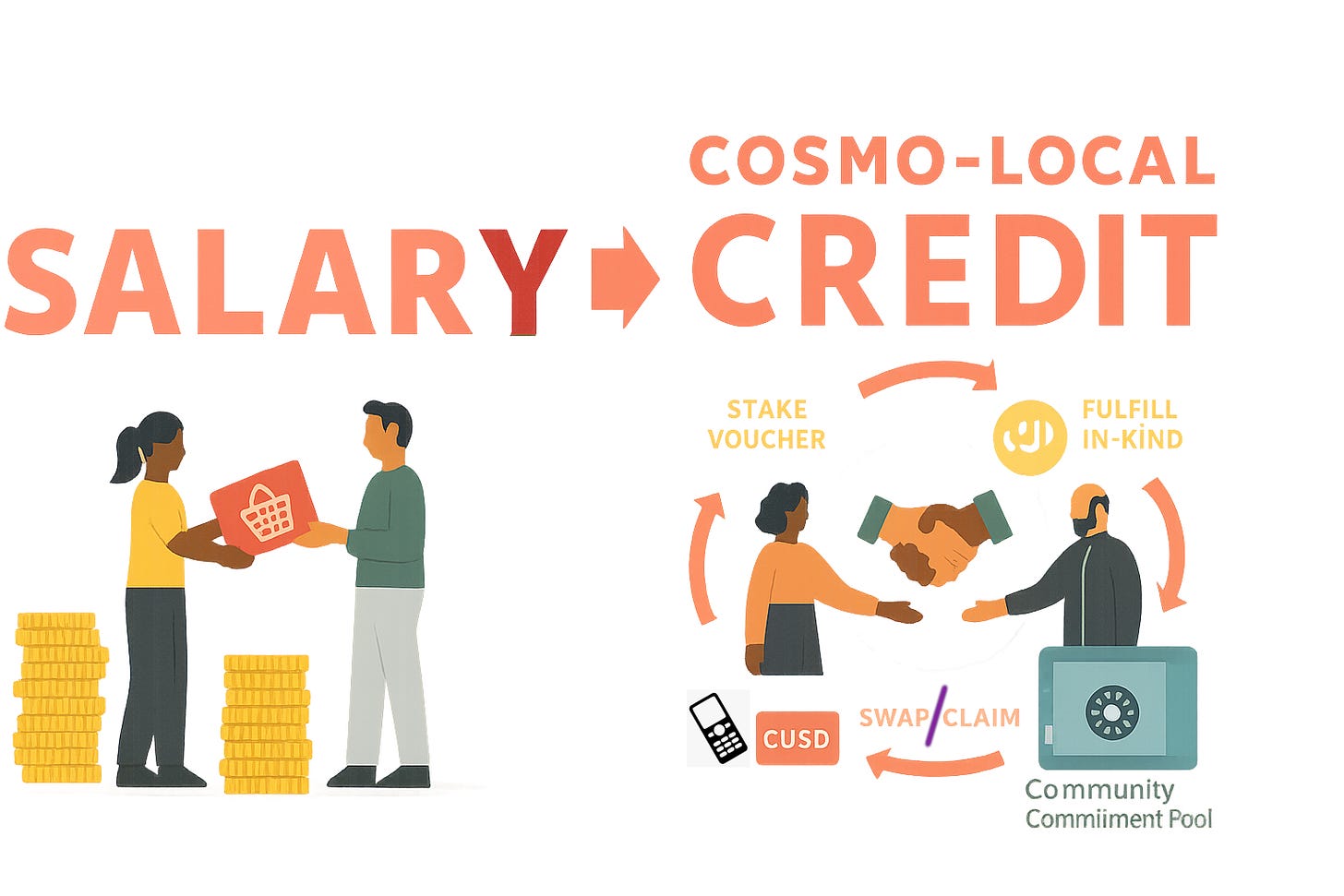Salary Without an Employer?
Simpler Than We Might Think
We treat salaries like gravity: payroll cycles, HR forms, waiting for the 30th. What if everyday access to resources didn’t need an employer or lending interest at all? What if it were as simple as neighbors and organizations offering what they already do best, tapping a shared line of credit today, and settling up in-kind tomorrow?
That’s the heart of cosmo-local credit. You create a physical or digital voucher (a gift card for your goods or services) and stake it in a community commitment pool. That voucher is your collateral. Against it’s value, you draw what you need now, like money or supplies, without paying interest. Your outstanding obligation is just the value of your vouchers the pool holds. To settle, you can return what you drew and pull your voucher back. Or (and this is the magic) someone else can swap in their own voucher of equal value, take yours out, and spend it with you for your goods or services. In that moment the claim glides from you to them. Later, another neighbor can take their voucher, and so on. Because vouchers can pass hand to hand, the credit simply keeps rotating. It’s salary-like cash flow, but community-backed and recyclable.
This is important …. a zero-interest loan you can repay in-kind …. is something we really really need to think about.
Picture a town where. A small school stakes a term’s worth of tuition and meal vouchers and draws what she needs for textbooks (still zero interest). A grocer likes the school lunch program, so she swaps in her own grocery vouchers, takes the schools’s voucher, and later redeems it for her child’s school fees and meals. The claim has moved; the loop continues.
No bank drama, no hidden yield games - just people fulfilling promises in ways everyone can see!
Why does this feel better than a paycheck? Because there’s no single boss fronting the entire float, no interest siphon, and no opaque bookkeeping. Liquidity comes from a shared pool, repayment happens as you deliver the work you’re known for, and value keeps circulating close to home. The memory of who swapped, redeemed, and fulfilled is public and simple, so trust grows with every cycle. In practice, that means shopkeepers, students, clinics, and farmers (folks with smartphones and folks without can join through QR cards) and get the same no-interest breathing room.
Worried it’s complicated? The rails are straightforward; the safety comes from light guardrails. Local guarantors vouch for entrants, attested on-chain activity keeps everyone honest, and pooled oversight makes sure releases match real usage and fulfillment. It’s all there to keep the loop healthy, not to slow it down.
Maybe salaries were training wheels?
With cosmo-local credit, we’re all mutual service providers: access what you need today, repay in-kind as you show up for your community, and let claims flow to whoever can use them next. Payday becomes any day, and the neighborhood gets stronger each time a promise is kept.
Read more on cosmo-local credit and the work of Grassroots Economics here.



Beautiful. Very similar to what we imagine for Rainbird Village... www.rainbirdvillage.com
onboarding people locally is one of my goals. In parallel I am continually thinking about 'use cases' - one has been for managing 'volunteering' , in things like co-ops, or communities. One structure that seems promising is that a co-op or community at their general assembly adopts a pool that every member agrees to seed with enough work equivalents to the time and work the board members will put in...
if there are ten x 2 hour meetings a year x 5 board members = 100 hours, then each community member would put in a 1 hour voucher.
I am also interested in how to incentivize stewards, seeders and on boarders.
I know there's the possibility for pools to charge fees etc, but I wonder if this could be 'brought into the light'/encouraged a bit more?
Like I see one version of commitment pools like vesicles delivering resources to different places in both skills and money.
Like various purpose curated 'dream teams' who could move from project to project.
Almost like if a community is looking to build housing, it would be good to have a pool that contains builders, accountants, food services...and money!
Once the housing was built, resources would flow from the new beneficiaries back into the pool, including to the stewards who curated it.
So: I suppose that boils down to 1) best practices to incentivize volunteering with reciprocity
2) commitment pools as investment vectors that either unlock local capacity or bring human and financial capacity to various projects